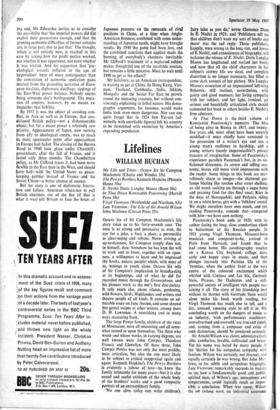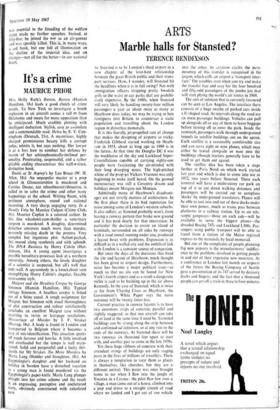Lifelines
WILLIAM BUCHAN
My Life and Times : Octave Six Sir Compton Mackenzie (Chatto and Windus 35s) The Powys Brothers Kenneth Hopkins (Phoenix House 50s) E. Nesbit Doris Langley Moore (Benn 50s) In That Dawn Konstantin Paustovsky (Harvill Press 30s) Virgil Thomson (Weidenfeld and Nicolson, 63s) Late Victorian: The Life of Sir Arnold Wilson John Marlowe (Cresset Press 55s) Octave Six of Sir Compton Mackenzie's life story takes us to his forty-seventh year. The tone is as strong and persuasive as ever, the eye for a joke, a face, a place, a personality as clear-seeing and urbane. Never striving at up-to-dateness, Sir Compton simply does not, in himself, date. Somehow he has kept the will to work and to know, together with an open- ness, a willingness to learn and be impressed (by books, nature, people) which, with most of us, belongs to youth alone. Octave Six tells of Sir Compton's implication in broadcasting at its beginnings, and of what he did for recorded music through the Gramophone, and his pioneer work as the sec's first disc-jockey. It tells much else, about islands, gardening, wild flowers, birds, Highlanders and writers and theatre people of all kinds. It contains an ad- mirable essay on Jane Austen, and some shrewd but genial swipes at other writers, among them D. H. Lawrence. A nourishing and in many ways reassuring book.
The large Powys family, children of the vicar of Montacute, were all interesting and all some- what turned in upon themselves. The three who wrote and whose works, in varying degrees, are well known were John Cowper, Theodore Francis and Llewellyn. Of these three, John Cowper Powys was not only the most prolific, most articulate, but also the one most likely to be subject to critical reappraisal again and again. Kenneth Hopkins's The Powys Brothers is evidently a labour of love—he -knew the family intimately for many years—but it is also sound and useful criticism of the whole body of the brothers' works and a good composite portrait of an extraordinary family.
'No one alive today can write children's
fairy tales as you do,' wrote Clemence Dane to E. Nesbit in 1921; and 'Publishers tell me that children don't want my sort of books any more' was the sad reply. Those publishers, happily, were wrong in the long run, and lovers of E. Nesbit, and connoisseurs of biography, will welcome the reissue of E. Nesbit. Doris Langley Moore has lengthened and revised her book; and now that all the chief characters in her subject's stormy life are dead, and complete discretion is no longer necessary, has filled in some dark corners of her picture. Mrs Langley Moore's evocation of an impassioned left-wing Bohemia, still instinct, nevertheless, with gaiety and good manners; her living sympathy with her subject; and her light, ironical, yet serious and beautifully articulated style should commend her book to others besides E. Nesbit's firm admirers.
In That Dawn is the third volume of Konstantin Paustovsky's- memoirs. The bliss of being alive in Russia in 1917, and twenty- five years old, must often have been severely modified—it must chiefly have consisted in the possession of a writer's eye and ear, a young man's resilience in hardship, and a young writer's (surely impermissible?) private treasure of imagination. Some of Paustovsky's experience parallels Pasternak's but, in its un- fictioned directness, its severe and telling eco- nomy, leaves still more vivid impressions with the reader. Some things in this book are mar- vellously sharp as images—the shattered gas- lamps blazing like torches after street shelling; • an old monk sucking tea through a sugar-lump and praising God for this final treat; Kiev in the days of Skoropadski, and Petlyura riding in on a white horse, girt with a 'folklore' sword. We might ourselves have seen much, and yet, reading Paustovsky, concede that—compared with him—we have seen nothing.
Paustovsky's book ends in 1920, with its author facing the long, slow, comfortless climb to betterment of the Russian people. In 1921 young Virgil Thomson, Missouri-born musician and composer-to-be, arrived in Paris from Harvard, and found that he had come home. His autobiography touches on a Kansas City boyhood, college days, early and happy steps in music, and then plunges joyously into Parisian life of the 'twenties, when the author lived at the very centre of the coloured excitement which whirled with Cocteau and Les Six, Gertrude Stein, Picasso, the Dadaistes and a still- powerful society of intelligent rich people sus- taining it all. The story of his friendship (not without its thorns) with Gertrude Stein would alone make his book worth reading, but Virgil Thomson has much else to tell, and a dry, amused, amusing style to tell it in. His concluding words on the dangers of music as an industry, 'with performances overblown, overadvertised and oversold,' are true and timely and, coming from a composer and critic of such distinction, should be pondered seriously.
Sir Arnold Wilson was clever, administratively able, combative, lovable, cultivated and brave. Yet his name was hated by many people in the 'thirties for his outspoken sympathy with fascism. Wilson was certainly not discreet, and equally certainly he was wrong. But John Mar- lowe, in his subtle and scrupulous biography. Late Victorian, remarkably succeeds in making us see how a fundamentally good and public- spirited man, of Wilson's age, antecedents and temperament, could logically reach so impos- sible a conclusion. When war came, Wilson the me (whose work on industrial assurance was essential to the founding of the welfare state) made no further speeches. Instead, at fifty-five, he joined the RAF as an air-gunner and was speedily killed. This is, in many ways, a sad book, but one full of illumination on the decline of the imperial idea, and on changes—not all for the better—in our national heart.



































 Previous page
Previous page